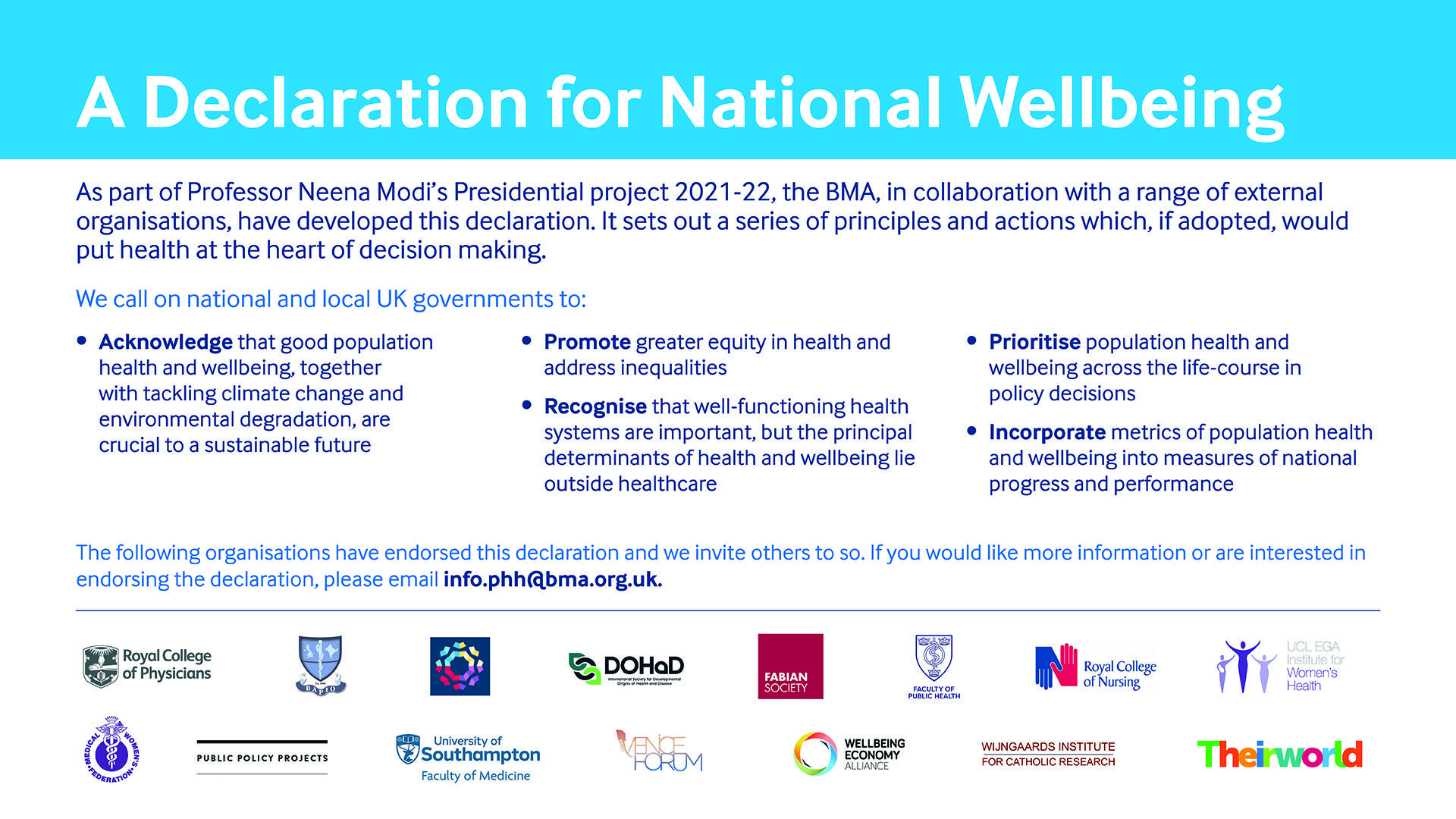Good population health is essential for sustainable economic growth. However, a key barrier to health being a central focus of government policy is the flawed view that economic growth drives population health, and a failure to recognise the role of population health in driving economic prosperity. This has led to a failure of successive governments to prioritise health, creating a ‘ticking time-bomb’ of ill-health.
Poor population health is not just bad for the individuals affected. It impacts adversely on national productivity and prosperity, and increases pressures on health services, which are already struggling to cope with the growing demands of an increasingly unhealthy population, and the challenge of recovering from the backlogs in care exacerbated by the impact of the COVID-19 pandemic
UK governments need to urgently recognise the role of population health in driving economic prosperity and address the wider determinants of health through long-term cross-departmental and cross-sector collaboration.
We propose action in three key areas:
- Improving how governments measure success, moving away from the narrow economic index of GDP and ensuring that health indicators are central to how success is measured.
- Ensuring cross-government accountability for population health that transcends political party boundaries.
- Improving appraisal guidance and mechanisms to ensure policy-makers consider the health impacts of any new decisions.
Moving beyond GDP as the predominant measure of success
GDP (gross domestic product) is a flawed measure of national success. It is a narrow indicator which includes activities that actively harm health while failing to consider activities that contribute to health.
It also tells us nothing about the distribution of economic growth. GDP may rise, but unless government directs gains towards areas of greatest need, health inequalities will continue to widen.
There is a growing consensus on the need to move beyond GDP and introduce a more balanced set of measures of a nation’s success, including health. Promising developments include the Health Index developed by the ONS (Office for National Statistics) or the National Performance Framework used in Scotland. Although it is challenging to move beyond GDP, it is essential.
Key recommendations
- Further development of the ONS Health Index, including its expansion to all UK nations.
- Learning from the work undertaken in Wales, Scotland and internationally on how to embed health in measures of success across the UK.
- Publishing regular data on a broader range of indicators, such as the Health Index and the national wellbeing dashboard.
Cross-government accountability for health is essential
Improving population health and tackling health inequalities needs high-level buy in and sustained action across Government departments, with clear accountability at the highest levels. A ‘health in all policies’ approach is an important mechanism to support this, but needs to be backed by high-level buy-in across government.
There also needs to be independent scrutiny and accountability for population health which transcends the short-term nature of the UK political system.
Key recommendations
- All government departments should conduct rigorous health impact assessments for new policies, with these made mandatory in England, Scotland and Northern Ireland, in line with the approach in Wales.
- Develop a cross-government framework for health that supports coordination and collaboration across and between departments to prioritise health in all policies.
- Ensure that OHID (Office for Health Improvement and Disparities) has sufficient independence from the Department of Health and Social Care to ensure credibility.
- The UK Government should support the UK Wellbeing of Future Generations Bill, in line with developments in Scotland and Wales.
Improving how policies are assessed and evaluated to prioritise health
Current processes for evaluating new Government policies, for example the HM Treasury Green Book, undermine efforts to improve population health by failing to enable informed decision-making about health impacts.
The impact on health needs to be considered from the initial stages of policy development to ensure that policies developed are not harmful to health.
Key recommendations
- The Green Book technical guidance on valuing and quantifying risks to life and health should be updated and clarified, with clearer reporting standards that explicitly require analysis of health impacts.
- Government should reduce the reliance on external consultants to undertake policy appraisals and build internal expertise.
- Treasury should develop training for those undertaking policy appraisal on how to quantify risks to health.
Why governments need to take action now
Healthcare is not the primary determinant of health
Policy decisions around health too often focus on treating ill health, and the structure, organisation and funding of healthcare. Health services are important but are not what drives health; the conditions in which people are conceived, born, grow, live, work and age are the prime determinants of future health.
The foundations of good health start before birth and in the early years of life. Good early health trajectories require policies that drive good maternal and parental physical and mental health, value and incentivise parenting, promote good child development, and address wider issues such as poverty. Once established, these health trajectories require reinforcement at critical stages throughout the life-course.
Health is often framed as a matter of personal choice, however individuals have little control over many factors that affect health, such as air quality, transport infrastructure or the cost of food. There is a clear mandate for government to take bold action.
A healthy population is essential for a prosperous economy
The current policy focus on economic growth as the predominant measure of a nation’s success is damaging population health. While economic growth can be associated with improved health, it does not automatically lead to improved population health if governments do not distribute the benefits of economic growth to improve health and reduce inequalities.
Poor health is bad for the economy due to sickness absence, people being prevented from working and the impact of caring responsibilities. It also has direct costs for the Government through lost tax revenue, benefit payments and NHS costs.
Good health, on the other hand, can drive economic success including through increased labour supply, improved productivity, reduced healthcare expenditure, and greater innovation.
It is therefore vital that governments understand the fallacy of focusing on economic growth as a way to improve health, and instead recognise the role of improved population health in driving economic success.
Failure to address the causes of poor population health puts pressure on health services
Failure to make population health a priority leads to growing pressures on the NHS. For example, the care of people living with often preventable, long-term conditions makes up around 50% of GP appointments and 70% of hospital days.
The narrative around health focuses on the need to increase NHS capacity, staffing and funding to enable health services to cope better with the increased demand. While the UK needs properly resourced, efficient and effective health services, the solutions to reducing pressure on health services need governments to focus on stemming the growing burden of ill health.
The health of the UK is declining, and health inequalities are widening
Life expectancy is stalling and we are seeing a significant rise in chronic non-communicable diseases, such as diabetes.
Moreover, health inequalities are becoming entrenched; those living in the least deprived areas of the UK can expect to live far longer, while also experiencing a greater proportion of their lives in good health.
It is not enough to recognise the urgency and magnitude of the problem; radical, sustained action is needed through strong policies that target the causes of ill health.
A declaration for national wellbeing

As part of Neena Modi's Presidential project 2021-22, the BMA, in collaboration with a range of external organisations, have developed this declaration. It sets out a series of principles and actions which, if adopted, would put health at the heart of decision making.
We call on national and local UK governments to:
- acknowledge that good population health and wellbeing, together with tackling climate change and environmental degradation, are crucial to a sustainable future
- promote greater equality in health and address inequalities
- recognise that well-functioning health systems are important, but the principle determinants of health and wellbeing lie outside healthcare
- prioritise population health and wellbeing across the life-course in policy decisions
- incorporate metrics of population health and wellbeing into measures of national progress and performance.

